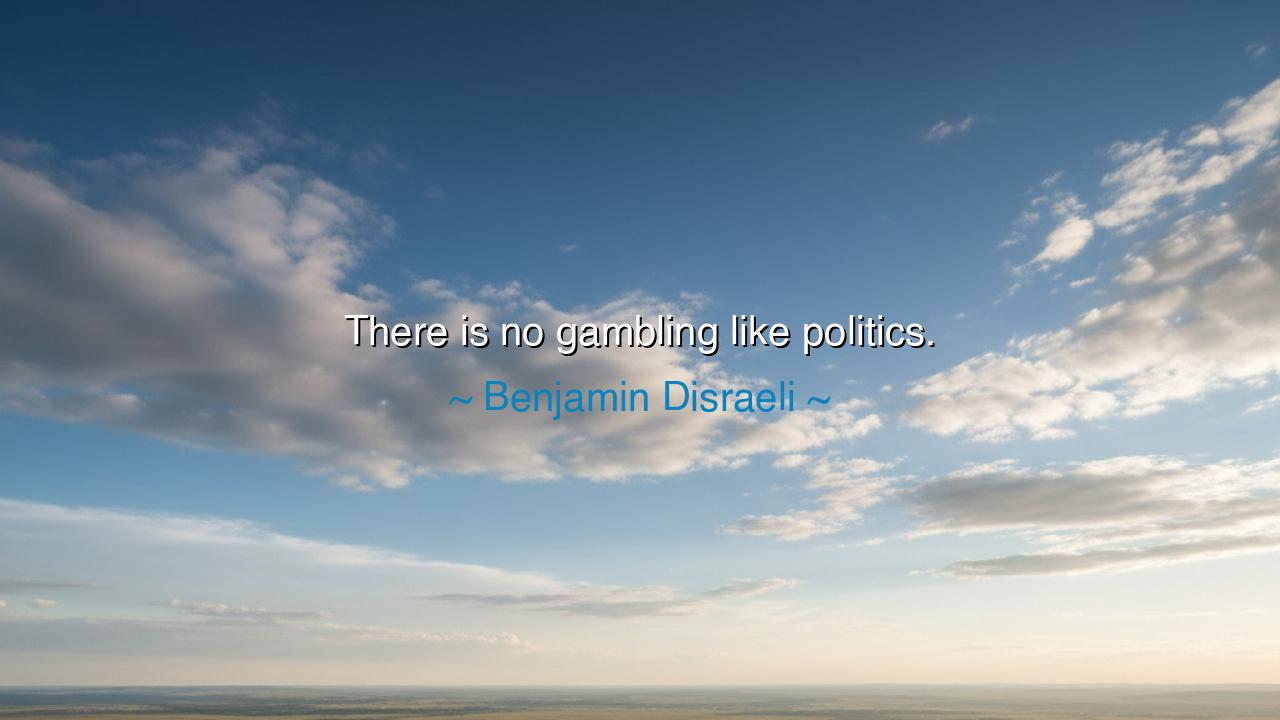
There is no gambling like politics.






The words of Benjamin Disraeli, “There is no gambling like politics,” ring with both wit and sorrow. They remind us that in the realm of governance, every choice is a wager, every policy a roll of the dice. For in politics, men and women gamble not with coins or cards, but with the destiny of nations and the lives of millions. The stakes are higher than any game of chance, and the rewards or losses echo across generations.
In the ancient world, rulers were often likened to gamblers seated at a great table, their chips the wealth of their kingdoms, their wagers the lives of their subjects. Some bet boldly and won glory; others gambled foolishly and lost everything. Disraeli, himself a statesman, knew this well: that politics is a contest where ambition, risk, and uncertainty collide, and no outcome is ever certain until the final hand is played.
Consider the story of Julius Caesar. In crossing the Rubicon, he wagered all he had—his honor, his army, his very life—against the power of the Roman Senate. It was the greatest gamble of his career, and it changed the world. Victory brought him the crown of Rome, but the same gamble also sealed his fate, for his ascent provoked the daggers of those who feared him. In Caesar’s rise and fall, we see the truth of Disraeli’s words: there is no gambling so perilous, so intoxicating, as politics.
And yet, unlike the gambler in a tavern, the statesman’s wager is not private. When leaders gamble, the people pay the price. Wars, treaties, reforms, and revolutions—all are gambles with uncertain outcomes. Some bring freedom and prosperity, while others sow ruin and despair. Thus, the wisdom of Disraeli carries a warning: those who play this great game must do so with reverence, for the table is sacred, and the stakes are nothing less than human destiny.
So let the future remember: politics is the highest and most dangerous of wagers. Enter it not with recklessness, nor with greed, but with courage tempered by wisdom. For while fortune may favor the bold, it abandons the reckless. To gamble with one’s own life is daring; to gamble with the fate of a people is divine responsibility. Let those who seek power know this truth, and weigh their wagers with the gravity they deserve.






LNLinh Nguyen
Disraeli’s quote is a sharp observation on the risks of politics. It does seem that, at times, political decisions are a gamble, with uncertain and sometimes unintended consequences. But can we ever fully remove the element of uncertainty from politics? If we did, would it stifle innovation and progress? Or is the unpredictability of politics a necessary part of the system that keeps things dynamic and evolving?
ATPhan Anh Thu
I see Disraeli’s point about politics being a form of gambling. The unpredictable nature of political outcomes—whether it’s an election or a policy decision—certainly makes it feel like a gamble at times. But how do we ensure that this gamble doesn’t turn into a game of chance for the public? Shouldn’t there be a balance between calculated decision-making and the risks politicians take on behalf of their people?
L6Ngoc Linh 6a5
Disraeli’s comparison of politics to gambling could be seen as a critique of how unpredictable and volatile the political landscape can be. It’s true that sometimes, political outcomes seem influenced by chance more than by sound strategy. Does this undermine the legitimacy of politics, or is it just an inherent part of human nature that we try to control everything, even when we can’t foresee all outcomes? How do we navigate this uncertainty in modern political systems?
HNha nguyen
This quote from Disraeli is interesting because it suggests a certain level of uncertainty and volatility in politics. In many ways, elections and political decisions can feel like a roll of the dice—will the decisions lead to prosperity or failure? How do you think politicians weigh the risks in their decisions? Are they gambling with the country’s future, or are they just playing within the system, knowing that luck and circumstance often play a large role?
TPLe Thi Thien Phuc
Disraeli’s comment on politics as gambling might be a cynical take, but it’s hard to deny the parallels. Both politics and gambling involve calculated risks, chance, and strategy. But does this mean that the outcome of political decisions is purely down to luck, or do the decisions of leaders have more weight than we might give them credit for? Should we rethink how we view politicians, given this ‘gambling’ nature of politics?